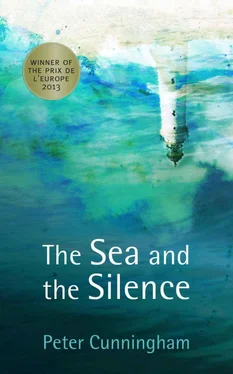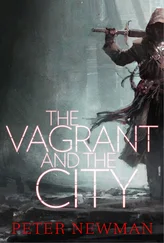Religion, on the face of it, was of little consequence in 1922 when a local militia came to burn Gortbeg. However, an advance warning had been sent allowing Langley to ship out furniture, paintings and chinaware, so although the burning honoured ancient rituals, the saboteurs were less than committed and only the east wing, which included a breakfast room with wallpaper by Pugin, was razed. Bureaucracy triumphed where fire had failed. More than a decade later, Gortbeg and all its lands were acquired by the new government and paid for in non-negotiable bonds. Langley went to London, disposed of a diamond the size of a wren’s egg, put £2,000 into War Loan and bought the lighthouse, the coastguard station and fifty acres in Sibrille.
Ronnie amused me, and always had, from the first day I met him. What had once come across as pompousness, even arrogance, was in fact an utter belief in himself that was endearing and frequently comical. He had gone to Belfast in 1943 to join an armoured regiment and had taken part the following year in shoring-up operations in France, where he was lucky not to have been killed by a German sniper. Shipped back to hospital in England, he had spent the remainder of the war completing a correspondence course in estate agency, which enabled him when he came home to put letters after his name: Captain Ronald Shaw, M.B.V.I.
‘Ever tell you why I decided to join up?’
We lay on the soft summer grasses of the cliff in late July. Ronnie’s elbows jutted for the sky, their leather patches glistening. Between us and the horizon I could see men in mackerel boats, working their lines.
‘Was it because your father wanted you to?’
‘Absolutely not, the only thing my father approves of killing is foxes.’
Ronnie had a gap between his two front teeth, which, along with his big eyes, made even his attempts at being serious amusing. He said,
‘I was sitting out here, in this exact spot, one evening in 1941, and I could actually see German bombers blowing up cargo ships.’
‘From here?’
‘I could see the explosions.’
‘I don’t believe you.’
‘She doesn’t believe me.’ Ronnie looked up at seagulls. ‘Would someone please explain to this beautiful woman that I am incapable of deception?’
‘Very well, I believe you.’
‘Thank you. Well, as I say, here I was and out there I could see this appalling behaviour. On our sea. I decided I just had to stop it.’
I laughed. ‘And so you did!’
Ronnie sat up and looked out to the horizon. All of a sudden he looked like someone marooned in time from another era. I said, ‘It must have been hard.’
He put his arm around my shoulders. ‘I was lucky,’ he said quietly. ‘Many weren’t.’
‘I know.’
‘We shall always pray from them.’
We had both been brought up the Anglo Irish way, where emotion was ever seen as weakness. Ronnie leant out, plucked a sea-pink by its stem, held it up for a moment, then tossed it over the cliff.
‘To absent friends,’ he said.
Without warning, I felt my breaths coming short.
‘Ronnie…’
‘My God, I’m sorry, I’ve upset you.’
‘No, it’s not that.’
‘It’s not?’
I turned my face away and closed my eyes.
Ronnie said, ‘Are you unwell, darling?’
‘Sort of,’ I said, turning back to him. His round eyes and startled face made me sniffle and giggle at the same time.
‘Oh God, what?’ he said.
‘Ronnie,’ I said, ‘I think I may be pregnant.’
Langley and Peppy lived in the coastguard house, together with a woman called Delaney, Ronnie’s nurse who now cooked, and, for most of the year, Peppy’s younger brother, Stonely. One’s first impression upon entering the coastguard house was that a burglary had taken place. Doors and the drawers of cupboards and chests stood open or pulled out in every room, and from the innards spewed their incoherent contents. On the floors stood mounds of books, sacks of potatoes, the wheels of bicycles, rubber boots, riding crops, stacks of pictures, golf clubs, boxes of cartridges, fishing rods, waders, suitcases, jam-jars, cases of gin, propagating vegetables, milk churns, bedding, the mounted masks of famous vixens, oil drums, boxes containing the Gortbeg chandeliers, camp beds, step-ladders and a rocking horse. Such disorder went unnoticed by the inhabitants, who picked their way carefully through the chaos until they found what they sought — a book, or a cup for tea, or a chair without a cat in it.
When I first met Langley, he was stooped and arthritic, spindly legged and alarmingly thin, but the one time I saw him hefted up on a difficult mare of Peppy’s, I grasped in an instant how he fitted his horse, the lightness of his hands and how all the soreness went out of him. He had hunted for more than fifty years with wily, ragged-tongued hounds, spreading them over the tricky gripes around Gortbeg like a tan cloak. Man and beast, earth and sky, human blood and river water became all the one to him. He had lived it not once, but countless times; once a week, Langley fell to his knees in the church in Sibrille and thanked God for His munificence.
In the vast, upstairs room of a nursing home not far from Dublin’s Shelbourne Hotel, my baby was born. The doctor stayed with me all night, and three nurses. With all my heart I believed that I was going to die. As they kept passing the cold flannel over my brow, I could feel the shape of my veins standing out there. Then, just when I had screamed my utmost, and begged for death — for me and for my child and for the whole world — I could feel an easing in the bones of my pelvis, which must have dislocated. On my thighs, I felt the blood rush out on to the rubber sheets and then the most unforgettable feeling, the passing from me of such a warm and solid proof of my own happiness as it moved, still partly in me, and I reached out my wet hands, crying although I didn’t care who knew, pumping blood and milk, and I said, ‘My love.’
Ronnie had been up two days before, lunching at his club, bemused by the fussing nurses. Telegrams were sent to Sibrille relaying the news, but I didn’t expect to see anyone until the end of the week and so was surprised when next day the door opened and Peppy walked in.
‘You poor child,’ she said and kissed me, her nose cold as mutton. Many years before, her father had bought her a house in Dublin and she sometimes came up to inspect it. Now she went to the cot in the corner of the room. ‘Oh my God, he’s big enough,’ she said, sniffing. ‘Just as well he didn’t go full term.’
Peppy’s winters were given to fox hunting and shooting, her springs and summers to sea and river fishing.
‘Is he taking his bottle well?’ she asked.
‘I’m feeding him,’ I said.
Peppy frowned and sat in a wing-backed chair which the nurse had brought over. ‘I never did.’
‘Could you not?’
‘Oh, I expect I could have, I can’t remember, but they thought it better not to.’
‘The same here, but I insisted.’
‘If one must, then not beyond a few days.’ Peppy shivered, then smiled radiantly. ‘You look so beautiful!’
‘How is Ronnie?’
‘Delirious. He’ll be up tomorrow, or Thursday. He’s cub hunting.’
I laughed.
‘I told him to be careful, not to break his neck before he’d had a chance to see his son and heir,’ Peppy said. She glanced to the corner. ‘No causes for concern?’
‘They say he’s perfection.’
Peppy removed her hat and lit a cigarette. She bent forward and unlaced her leather knee boots and shook them off, then blowing smoke from the side of her mouth, sat back and crossed her legs. She said,
‘I remember when Ronnie was born. I had him in Gortbeg, the most dreadful experience. Langley was in and out, but the person I missed most was my mother.’
Читать дальше












![Edward Ellis - Adrift on the Pacific - A Boys [sic] Story of the Sea and its Perils](/books/753342/edward-ellis-adrift-on-the-pacific-a-boys-sic-s-thumb.webp)